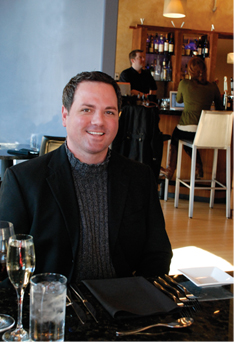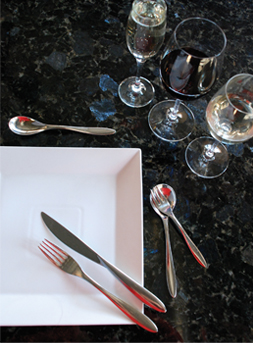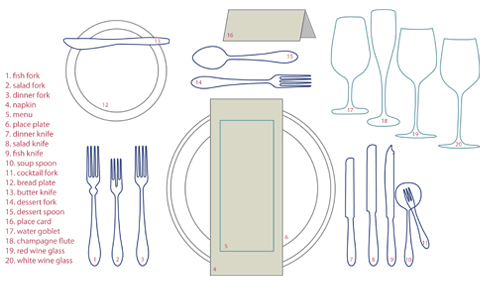The business of manners
 You’re almost there. Your resume worked like a charm. You feel confident the initial interview went well. Now the company has invited you to dinner, where you’ll be sharing the table with several potential new bosses.
You’re almost there. Your resume worked like a charm. You feel confident the initial interview went well. Now the company has invited you to dinner, where you’ll be sharing the table with several potential new bosses.
The company executives have selected one of the city’s most sophisticated upscale restaurants for your meeting. Spouses will be attending, too. Do you know what to do?
“Etiquette is and can be the ultimate business tool,” says Travis Tucker, owner of bleu restaurant. “So many sales and job offers happen over a meal. And if you’re dining with someone who doesn’t have the basic manners to handle himself or herself at dinner — that says a lot about his or her character.”
Tucker is doing his part to improve everyone’s manners by offering individualized etiquette courses for Columbia businesses and organizations.Anybody is welcome to give him a call to work out dates and pricing.
While some special-occasion business events can feature up to nine-course meals, Tucker keeps his classes at a manageable three to four courses, reviewing modern manner basics like how to hold utensils; locations of silverware, glasses and plates; and where to leave tabs of butter or sugar packets. As food and wine are served, he leads the way on what to expect and how to behave.
For those who have been trained, the class offers an opportunity to brush up on dining decorum. In today’s competitive work environment, it pays to be skilled in all things, he says — including etiquette. “You can be a brilliant surgeon, but if you can’t handle yourself during a dinner out with colleagues, then that’s going to hold you back. To grow professionally, you need to be able to handle yourself in all sorts of social situations.”
 David Townsend, president and CEO of Columbia-based Agents National Title Insurance, invited 17 employees from the organization’s satellite offices to one of Tucker’s etiquette courses last October. Even now, he says, they’re still talking about how much they enjoyed the experience.
David Townsend, president and CEO of Columbia-based Agents National Title Insurance, invited 17 employees from the organization’s satellite offices to one of Tucker’s etiquette courses last October. Even now, he says, they’re still talking about how much they enjoyed the experience.
For insurance agents, work normally requires extensive travel and often includes sharing meals with current and potential customers. “Setting a good example and making sure you’re acting properly in business situations is extremely important, especially when it comes to dining,” Townsend says. “Just this year I have attended everything from black-tie events to backyard barbecues, and the things Travis is teaching have applications throughout.”
Jeremy Bloss, student services adviser for the McNair Scholars Program at the University of Missouri, assists undergraduates in gain admission to graduate school. The office often sends students to academic conferences or to meet with deans and directors.
This fall, Bloss took a group of 20 students to dinner at bleu for Tucker’s course. Students learned how and when to hand out business cards; the importance of thank-you notes; and the art of conversation, including subjects to be avoided. The students’ response to the class, he says, has been nothing but positive. Knowing what to expect has greatly eased their anxiety.
“Some of our students have never been in situations where they need to know business etiquette,” Bloss says. “It’s something that they hadn’t thought much about, but appreciated having someone to talk them through the formalities.
“Travis does a great job with the class. It’s a formal dinner, but fun. It’s an important lesson — how to keep your poise, but enjoy the meal.”
If Tucker were to get his wish, etiquette would become part of everyday learning within the school system and reinforced from the early years on up. Without it, he says, too many young people don’t know what to do.
“The reality is that we’re all being evaluated on our appearance and our actions,” Tucker says. “Good manners have nothing to do with how much money a person makes. Your socioeconomic background doesn’t dictate your future in this country; but how you are perceived and how you carry yourself will.”
Business etiquette basics
RSVP
Bleu restaurant owner and etiquette expert Travis Tucker says it’s clear that modern society has become far too relaxed about responding to formal invitations. Ignoring the invitation is not the same as declining. “You’re not going to hurt anybody’s feelings by letting them know you can’t attend, he says. “You will, though, do them an injustice by not letting them know. People need to know how many guests will be attending.”
Dress
When sending an invitation, there is no such thing as “black-tie optional.” Is it black-tie or not? Guests need to know so they can dress appropriately. “According to etiquette, it’s always best to err on the side of being a bit too dressy, especially for business events,” Tucker says.
Introductions
When you’re at a party, introductions should move from oldest to youngest, or in a business scenario, from the senior employee to junior.
Alcohol
Whether you don’t know much about wines or simply don’t like the taste, the basic rule is an easy one: It’s always OK not to drink. If you do, the general guideline is two drinks during a two-hour meal. “We’ve all seen the person who has overindulged,” Tucker says. “But it’s not good during a business meal.” If you’re right-handed, hold your beverage in the left. It will free you up for shaking hands and meeting people.
Connect
There’s no need to be too timid or to let the rules of etiquette trip you up. Just do your best. If you make a mistake, correct it and move on. Business dinners, whether they’re small and intimate or an enormous gala affair, are about socialization. “Most of us are shy at times, but it’s important to take the opportunity to network and connect with others,” Tucker says.
Thank you notes
In Tucker’s opinion, the art of the hand-written thank you note has been lost, and it’s a formality well worth reviving. A person can never go wrong in expressing gratitude; and that holds true on the personal level as well as in business. Studies have shown that job candidates who send a hand-written thank you note have a 20 percent greater chance of getting hired than those candidates who do not. “Just that one act can make all the difference,” Tucker says.


